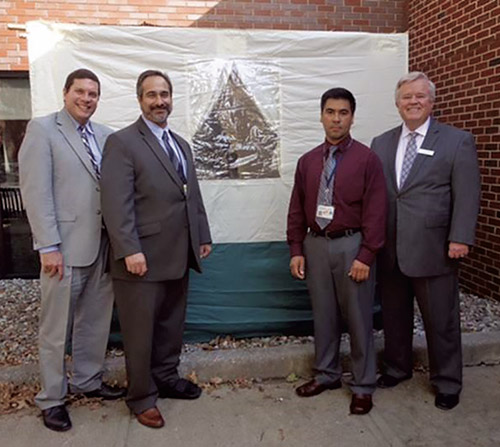
Summit—Tucked away in a secluded courtyard, under the open sky, between two Medical Arts Center buildings at Overlook Medical Center, is a sukkah.
To some it may look like a square tent with an odd roof and a picnic table inside, but it is much more. The sukkah is a visible symbol of the importance the medical center and its staff place on honoring the diversity of all who come to the facility.
Orthodox Rabbi Nathan Zemel, MD, who is a member of Overlook’s Diversity Council, says the sukkah is there “for Jewish persons who observe the Biblical commandment which dates back to when the Jewish people were redeemed from Egypt.” They had been traversing the desert for 40 years and “were very dependent upon God. They had no water, no food, no change of clothes,” and lived in sukkah made of whatever they found. Sukkot, sometimes called the Feast of the Tabernacles, is an eight-day festival, which commemorates those 40 years, and the main commandment is to eat in the sukkah, although many observant Jews will actually build a sukkah and live in it for the entire eight days. “In moving out of our houses, we forego that security and depend upon the grace of God,” Rabbi Zemel says.
The sukkah at Overlook is there for patient family members and caregivers, patients and staff to use during Sukkot. It is a kosher sukkah, located under an unobstructed sky, with a proper roof “that is more shade than sun,” made of materials that are grown, not manufactured, he says. Inside there is a picnic table for all to use.
Along with the sukkah, in the hospital close to the emergency room and just outside the cafeteria, there is a kosher pantry filled with kosher items, says Overlook’s Manager of Food Services Michael Atanasio. Rabbi Zemel, who is a chaplain at the hospital, stocks it. Its location means “when an ambulance crew brings in a patient during the holidays” members who are keeping kosher may pick up a snack or a patient’s family member can get something. “Otherwise, they may be in a pickle,” says the self-described “hands-on Rabbi” who says he wants to make sure patients, families and others have their nutritional needs as well as their spiritual needs met. [
There’s even a combination lock on the pantry, because on Shabbat and other days during the year when “work is forbidden,” the pantry can be accessed. Work includes using any electrical equipment, such as electronic locks, elevator buttons and doors that open by using motion detectors, he says. To that end, Overlook provides a Shabbos elevator that stops at each floor on Shabbat, which begins at sundown on Friday and ends at sundown on Saturday. There is also “a side door that is a few feet off the side of the front door, where they don’t activate electrical equipment in order for it to open,” Rabbi Zemel says.
He extends his “thanks to the administration—Hospital President Alan Lieber and Administrator Gerry Durney—for being very helpful… and most accommodating.”
Diversity doesn’t begin and end with consideration of religious needs. CEO and Publisher of TAPinto.net Michael Shapiro who attended the reveal of the sukkah, supports the diversity initiative. “Diversity is one of our communities’ greatest strengths. It’s so important for community partners to respect and cherish this diversity. Overlook is at the forefront of doing so and it’s my hope other community partners follow in the rich tradition they have established.”
There is also diversity in the menus offered to patients. Atanosio says Overlook “offers kosher meals on our menu and cafeteria” and those meals are also suitable for Muslims who are halal. Vegetarian options are also available.
In another area, for the past two years Overlook has been “certified as a LGBTQ organization,” said Durney. This year Medical Imaging Coordinator Bertin Navarro and Atanasio took the lead in getting certified.
The certifying group “stepped up the requirements for recognition this year,” said Durney, who credited the two men with their work to make sure the requirements were met and the application filed on time. No results have been received yet, but the men feel confident.
Other initiatives being used include three-dimensional printed maps to help people find their way around the hospital, way-finding apps for those who are more technologically inclined, translation services with Cyracom devices in every department and devices for people who are hearing impaired. The hearing devices, which cost about $30, are also for sale for visitors in the gift shop.
Recently deployed are kiosks strategically located in the medical center and its MAC I and II. Visitors can find out how to get someplace and are able to email or text the directions to themselves or others, says Durney.
By Barbara Rybolt













